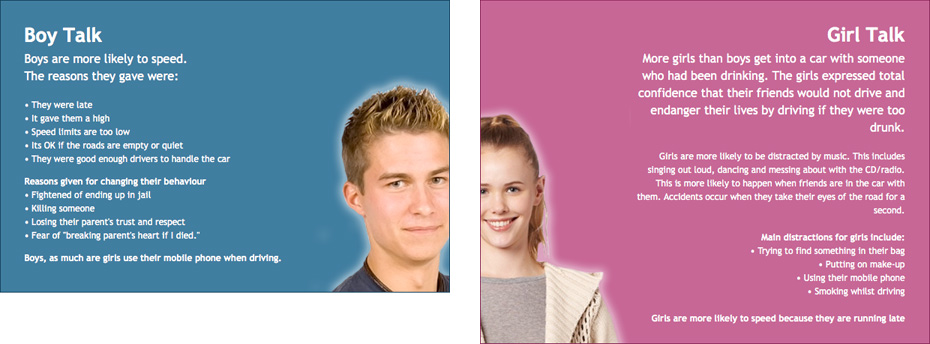| |
| This isn't about scare tactics, this is the reality of young people driving on British roads. Interestingly, research suggests that teenagers have less control over their actions and behaviour and that the brain is not fully developed until the age of 25*. Or to put it another way, teenagers are not always fully capable of make sensible decisions. |
|
| |
| According to research: |
• One in three road deaths are aged 15-20, yet they only account for one in eight road licence holders
• One in five new drivers will have a crash within the first 6 months
• Teenagers are three times more likely to be involved in fatal crashes compared to other drivers
• A high proportion of teenage deaths occur when there is one car involved, where the vehicle leaves the road and overturns or hits an object such as a pole or tree |
|
| |
| The reasons for these statistics are: |
• Lack of maturity and driving experience
• Risk-taking behaviour such as speeding, in particular going too fast for road conditions
• Failure to wear seatbelts
• Overconfidence
• Drink or drug driving
• Drowsy driving (driving when tired either early in the morning or late at night)
• Distraction by passengers (vehicle accidents for teenagers increase with the number of passengers)
• Distraction by mobile phones and music |
| |
| * National Institute of Mental Health (NIMH) |
|
| |
| Tips for safe driving |
» The first 1000 miles are the most dangerous. Parents should try and spend time with their teenagers driving in the car to monitor their driving and encourage safe driving habits.
» Don't go out in poor driving conditions, unless strictly necessary
» Do not carry too many passengers
» Ask passengers not to distract the driver. If you are the passenger, do not distract the driver
» Turn off mobile phones to avoid temptation
» Stick to main roads rather than unknown country lanes
» Always wear a seatbelt
» Avoid driving late at night |
|
|
|
|
| |
 |
| |
